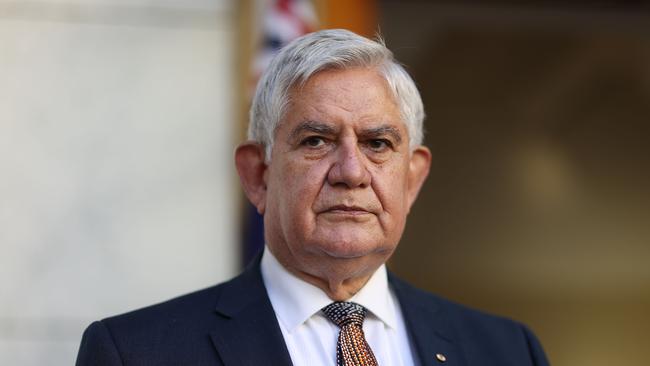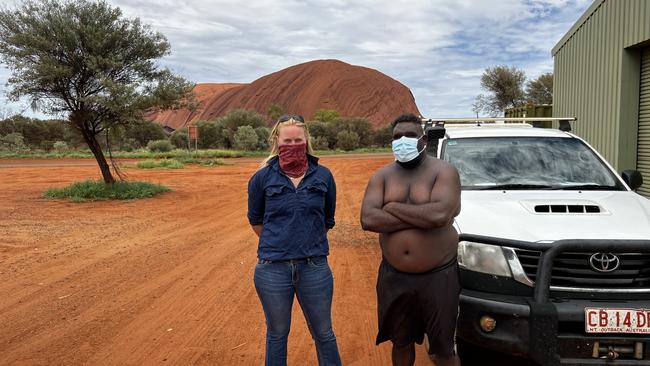Ken Wyatt acknowledges ‘multiple perspectives’ on law prohibiting alcohol in NT communities
Ten years on, the commonwealth is still considering whether the laws prohibiting alcohol in almost half of the Northern Territory have been effective.
Opinion
Don't miss out on the headlines from Opinion. Followed categories will be added to My News.
TEN years on, the commonwealth is still considering whether the billions of dollars pumped into enforcing the prohibition of alcohol in almost half of the NT has been effective, according to Minister for Indigenous Australians Ken Wyatt.
Since 2012, the Stronger Futures in the NT Act has kept alcohol out of many remote areas and communities.
Unless the commonwealth makes new arrangements soon, the laws will cease at the end of June, leaving those communities free to determine for themselves whether they want to permit alcohol for the first time since the federal intervention of 2007.
Mr Wyatt said his government recognised there were “multiple perspectives” on the application of the Act that need to be considered.
“Currently, there are (social) clubs (that serve alcohol) operating in some remote areas however there are also communities who wish to maintain a no alcohol policy,” he said.
In the small dry community of Barunga, 80km southeast of Katherine, a new liquor permit has been granted for the sale of alcohol at a social club within the community.

This model has been backed by some of Barunga’s community members, who say it will lead to less alcohol-related deaths on the roads and save residents a $200 taxi ride to the nearest regional hub that sells alcohol.
“The Australian and Northern Territory governments are considering the outcomes and future arrangements for the Stronger Futures in the Northern Territory Act 2012,” Mr Wyatt continued.
“Central to finding the best solution for communities with unique needs and goals in regard to alcohol regulation is engagement, which is why discussions commenced more than seven months ago and include working with community representatives such as the NT land councils and Aboriginal Peak Organisations Northern Territory.”
Mr Wyatt said there was no longer any funding tied to the Act, meaning the hundreds of public servants working across the NT’s health, education, policing and justice agencies would not be impacted by a sudden abolishment of legislation. Funding for those jobs was recently extended for two years.
Mr Wyatt’s comments come days after Hospitality NT chief executive Alex Bruce blasted the federal government over the prohibition of alcohol in communities, which he said “displaced” vulnerable people from their communities and their families.
Mr Bruce said the laws had led these people down a “spiral of criminality”, increased road accidents and left more people sleeping rough so they could buy alcohol.
Communities open to changing alcohol policy
AS laws prohibiting alcohol in parts of the Territory look set to be abolished, government and community must come together to discuss alcohol policy, says the head of the corporation representing one of the NT’s largest remote communities.
Mutitjulu Community Aboriginal Corporation chief executive Thalia Bohl-van den Boogaard said alcohol policy was a “complex issue”, but talking about it on a “community level” would be key to making the right decisions for each community.
“Too often these policies are made and set up by people who do not live on a community and they don’t deal with the actual consequences of their policies,” she said, noting that the topic had not yet been broached in the Central Australian community of Mutitjulu, which has a total ban on alcohol.
Less than four months out from the cessation of the Commonwealth-imposed laws, called the Stronger Futures in the Northern Territory Act 2012, there are mixed views whether they have achieved the intended aims after their 10-year imposition.

Critics have said the laws displace people from their community and lead to more road accidents and anti-social behaviour in town.
“There are pros and cons to both sides of the story,” said Ms Bohl-van den Boogaard.
“People find ways to drink alcohol if they want to, that’s just a given. But I definitely think that social clubs (that serve alcohol) can have benefits and it is something that communities, if they want to, should consider.”
The chief executive called for more emphasis on alcohol education.
“The education needs to be meaningful, in language and done so that people actually understand what they’re being told,” she said.
Opinion: No plans as last drinks called on alcohol laws
IT is common to hear local voices in the Territory say that the 2007 intervention undertaken by the Commonwealth Government did more harm than good.
Such a black and white statement ignores the national outrage about the levels of abuse occurring in some vulnerable Territorian communities at the time.
It also doesn’t do justice to the incredible hard work many health, police and education professionals have undertaken since that time in positions funded by the Feds as part of the intervention and subsequent programs.
The intervention set up a structure that made a lot of remote communities “dry”. In 2011/12 the Commonwealth government, then of a different colour, doubled down with the Stronger Futures in the Northern Territory Act 2012, which continued the prohibition policies in effect in nearly half of the Territory’s land mass.
At the time, Jenny Macklin, the introducing minister told parliament:
“The measures have been designed for the long haul — to reflect our belief that over time these measures will provide better opportunities for Aboriginal people.
“Over time, they will break down the barriers.
“Over time, they will pave the way for the path forward.
“And, over time, they will achieve their objectives.
“These measures are designed so that when they achieve their objectives they will not continue.
“Accordingly, we propose that the new Stronger Futures in the Northern Territory Act sunset 10 years after its commencement.”
The sunset the then minister speaks of is enshrined in section 118 of the Act, meaning come June 30 this year, unless the Feds choose to kick the problem further down the road, the Act ceases to be in effect.
There will no doubt be mixed views in the community as to whether, 10 years on, the legislation and the billions of dollars attached to it have achieved the intended aims.
That is not a criticism of the hundreds of hard-working NT public servants who are sitting in Stronger Futures funded positions right across the territory’s health, education, policing and justice agencies wondering what happens to their roles come July 1 – a solution that no doubt will have to be found.
But what is clear is that, if we continue to do more of the same, we will just see the same negative effects on communities, towns and cities across the Territory.
Prohibiting alcohol consumption on community, displacing vulnerable persons from their communities, from their family networks and meaningful on-country supports leads to a spiral of criminality, of increased fatalities on our highways and access roads, and more people rough sleeping hundreds and thousands of kilometres away – all so they can access alcohol.
Allowing regulated and restricted access within their community, through a not-for-profit community club model would start the challenging process of returning these vulnerable people to being more positive and productive members of their community and the broader society.

In June, 2019, the Chief Minister, pointing out that some 30 Alcohol Management Plans had backlogged and failed to be signed off by the Feds said:
“There are quite a few communities who have done that, done the work, put the plan in place and said ‘why can’t we have a social club down the road, you know, family friendly, playground out the back, responsible service of alcohol, I get to play some pool, watch the footy on the TV, I can do that in Darwin – why can’t you do that in some of these places? Why, because they’re Aboriginal? Let’s be fair.”
A year later in June, 2020, the NT Police Commissioner said Northern Territory needs to rethink its approach to alcohol and lift a ban on grog in Indigenous communities.
“We’ve been in a place where we’ve had restricted areas and a particularly paternalistic approach to how Aboriginal people, in particular, are allowed to consume alcohol.”
“There’s little doubt in my mind that people do gravitate to our major centres to get access to alcohol.”
So, the real question facing the community is, here we less than four months away from the whole framework potentially ceasing to exist. Where are the plans? We know some work has occurred between remote communities and government agencies. But where is the strong community consultation, both within remote communities and with the regions, towns and cities negatively impacted from displaced vulnerable people?
Will the urban populations get a say given they bear the brunt of the displaced anti-social behaviour?
Once again this wet season we know hospitality venues and their staff are on the front line, along with police and paramedics, dealing with the seasonal spike in snatch and grabs, aggressive itinerants, break and enters to access alcohol and staff and customer assaults.
All of these groups should be hoping and praying that this Wet is the last one where failed prohibition policies in force in the Territory make their work that much harder.
But, with no public plans in place, it may not yet prove time that the sun sets on intervention era alcohol policies in the NT.




